We’re delivering our Game of Thrones recaps in a series we call Game of Thrones Unlocked. These articles will contain spoilers through the episode under discussion. This week, Matthew Wrather tackles “The Queen’s Justice” (Season 7, Episode 3).
There was some disagreement in the comments section of last week’s recap about whether Sam is a good character or not and whether he’s important enough to be spending so much screen time on. He is and he is. And partly to confound those who would argue otherwise, I’m going to start at the Citadel, which turns out to be incredibly important to this episode thematically, and may turn out to have been important to the plot, depending on how Ser Jorah gets on after he stops being all, “Hey look at me I’m a Vermeer with this light coming through the window!” and gets his newly supple dermis back to Dragonstone.
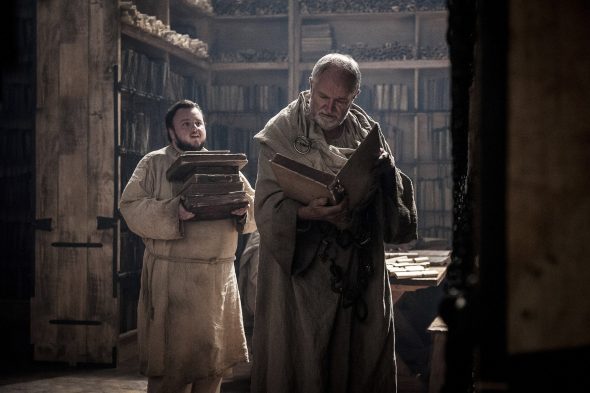
#sorrynotsorry
We come to the scene between Archmaester Ebrose and Samwell expecting at the very least a thorough dressing down. “How bad is it?” Jorah asks Sam, who shrugs and replies, “I guess we’ll find out tonight.” Sam is an unexpectedly good doctor, and not just at curing Greyscale: apparently he is also capable of growing a backbone.
What the Archmaester provides in place of a tongue-lashing is surprising and hard to pin down. It’s not exactly criticism, it’s not exactly praise; it’s not exactly forgiveness, it’s not exactly punishment. It is a lesson to Sam (and also to us, if we still need one at this point) about the kind of story Game of Thrones is. Nothing he says is wrong, and nothing he says is entirely right. He’s not wrong that Sam’s actions were irresponsible and put the entire Citadel at risk. He’s not wrong that the outcome was good—amazing, frankly—and that the good outcome should be taken into consideration. He’s not wrong that Sam should be proud of his newfound skill. And he’s not wrong that Sam should be punished for disobeying an injunction.
There are a number of ways to look at this episode. I’m going to focus on the structure, but as we go, keep in mind this theme of rigidity vs. flexibility, because it provides a useful barometer for evaluating what is important to various characters and how they are doing.
We go in knowing the title: “The Queen’s Justice.” Titles are a kind of promise, a contract with the viewer. Sometimes, the terms of the contract are unclear, but in a world as well-established and richly detailed as Westeros, a phrase like that is freighted with multiple kinds of significance.
Literally, “The Queen’s Justice” means “headsman” or “executioner”: Ser Ilyn Payne was the King’s Justice for Robert Baratheon, and the Stark children in King’s Landing learned early that one of their father’s moral absolutes—whoever passes the sentence should swing the sword—was not as absolute as they thought. Beyond that, the title highlights the the three queens (Danerys, Cersei, and Sansa ex officio) and their wildly differing conceptions of justice and how it is meted out. And finally, “The Queen’s Justice” must stand in opposition to “The King’s Justice,” and invites us to contemplate how the gender of the monarch affects her rule.
In each of our major power centers, Dragonstone, King’s Landing, and Winterfell, the woman ruler is visited by a man who wants something. The visit may not be wholly expected, but the man ends up sticking around. Dany gets Jon and imprisons him briefly; Cersei gets Tycho Nestoris (Euron is important, but not an exponent of this pattern) and hosts him as an honored guest; Sansa gets Bran and welcomes him home.
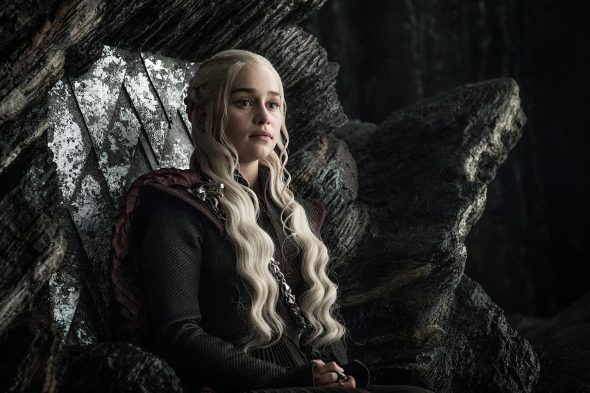
I’m on a rock. I’m on an island.
Let’s start on Dragonstone, which is main location of this episode, since Jon and Dany, as Melisandre points out, represent the uniting of Fire and Ice. (Am I the only one who thought of Spinal Tap?”) The first image of this episode is water crashing on rocks, and an unstoppable force meeting an unmovable object is not a terrible metaphor for what transpires on the island. Jon and Dany are both unyielding. There are moments of comedy: Unlike at Dany’s landing, we don’t miss the long trip up the castle steps, and the pants-shittingly terrifying dragon flyover is a nice reminder of the power imbalance, as is the asymmetric title warfare: “Daneyrs Targaryen, first of her name, Queen of the Andals and the First Men” etc., etc., vs. “This is Jon Snow. [plaintive look] He’s king in the north.”
Their first date is a disaster. Dany insists on fealty, and more than that she insists on her right and destiny as the ruler of Westeros. Jon insists that literally everyone has a profound misunderstanding of genre—that they think they’re in House of Cards but they’re really in The Walking Dead, which is something we at Overthinking It have been saying for a while now—and, interestingly, they are both fairly poor at articulating their positions persuasively. They believe utterly in their rightness, and their vision of Justice involves the world conforming to their beliefs. Under those conditions it’s hard to do effective debate prep. Dany is surprising the more flexible—she leads with strength, but she is humane: she apologies for the Mad King’s excessive cruelty. But still it’s left to Tyrion and Davos to argue, retort, insist, concede, cajole—to use the tools of rhetoric and politics to advance their aims.
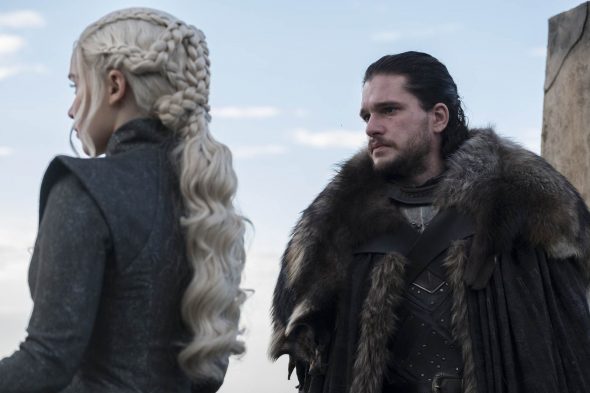
Lukewarm Water
When we return to Dragonstone, Tyrion’s pleading has blunted some of the sharp edges. Jon and Dany get a do-over of their first date, and they are still both terrible at making small talk. But despite some missteps they avoid talking about religion and politics and manage to hammer out a tentative alliance and establish some mutual fascination. Jon is indeed a very attractive brooder, and he piques curiosity when Dany quips, “All men like what they’re good at” and he retorts, “I don’t.” I was torn between shouting, “Kiss her, you fool!” and remembering that she’s actually his aunt. (Dany: “I am the last Targaryen, Jon Snow.” Me: “Nope!”)
In King’s Landing, the people are parade enthusiasts, or maybe severed head enthusiasts. Euron isn’t doesn’t follow pattern I am highlighting because he is not sufficiently adversarial with Cersei. They are pratically mirror images, and their vision of justice as tit for tat reminds me of much mistaken character a late Shakespeare play: “Haste still pays haste, and leisure answers leisure; / Like doth quit like, and measure still for measure” (M4M 5.1.466–7). They both believe in sorrow returned in like kind, but with more sadistic cruelty (the Ellaria Sand scenes are particularly brutal), and it is fitting when Euron’s obvious lie—“I give what no other man could give: Justice.”—is requited by Cersei’s obvious lie about marrying Euron at the end of the war.
Tycho Nestoris is the unexpected visitor who fits this episode’s structure. Cersei mistakes his talk of “investments” for the kind of transactional exchange she is used to contemplating, and falls back on the commonplace, “A Lannister always pays her debts.” It’s clear that Tycho is a fan: He is undeterred when she won’t claim credit for blowing up the red keep and insists, “Sometimes tragedies are necessary.” “Necessary” here doesn’t mean “inevitable” so much as “supremely convenient,” and you’d think that these two characters have a lot in common, but I am struck more by their differences. Balancing a ledger is not the same as settling scores. In the former case, the standard is objective. Red becomes black, and all is forgiven. But for Cersei, the coin of repayment is personal. She is judge, jury, and, with the final Sand Snake, Tyene, executioner.
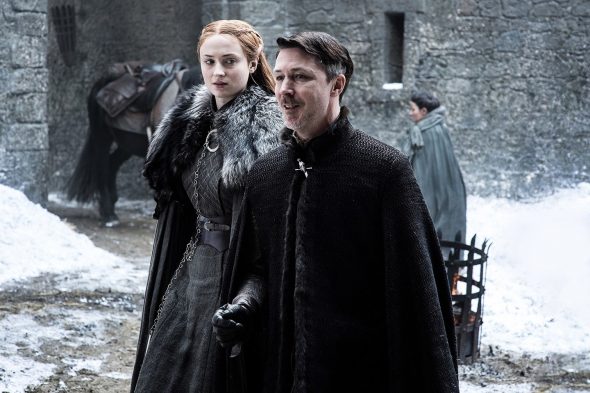
The Littlefinger Uncertainty Principle.
Finally, at Winterfell Sansa is no longer “smarter than she lets on” (Tyrion); rather, “she’s letting on” (Jon). The thing to note is not merely what a competent but what a gifted ruler she is: Planing ahead (shipments of grain), taking advice (how long is the longest winter?), sweating the details (the armor should be covered in leather). Littlefinger seems to trap and mesmerize with his quantum mechanical vision of every possible series of events happening all at once. And then, without any warning, cue Bran’s entrance, a genuinely moving reunion scene credibly acted by both Starks, and a conversation in the Weirwood where Bran says he sees every actual series of events happening all at once. Sansa is realistic, flexible, and responsive to circumstances. Her early idealism has been shattered by harsh experiences. But this is not an unmixed blessing: Bran alludes with tender sympathy to the hideous rape she suffered at the hands of Ramsay Bolton, a travesty of marital consummation, and the added cruelty that it should happen in her childhood home, and she needs to take a minute.
For all three queens, the question is what to value and how to meet circumstances with action. The answer seems to become more flexible, less stony (kind of like Jorah). Sansa is already there, Danerys is on her way, and Cersei is fleeing in the opposite direction. With all the talk about dragonglass, doesn’t her black, wide-shouldered regal costume make her look like she’s actually carved from obsidian?
So I am struck that in two notable cases in this episode metaphysical achievement coincides with acceptance of stasis. Bran literally cannot walk, but he also insists that he cannot succeed his father as Lord of Winterfell. He withdraws like a monk not just form the game of thrones, but even from the war of the living and the dead. Did you notice him say “when the long night comes” (not “if”)?
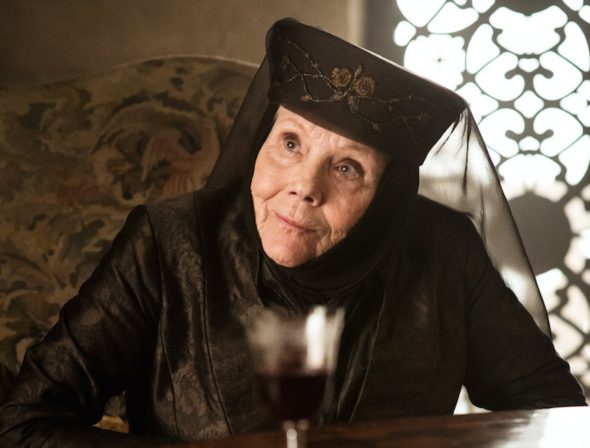
Yaaaaas Kween.
And Olenna Tyrell accepts stasis in death’s paralysis. Jamie’s arrival at Highgarden is a repetition with a difference of the motif that structures this episode, since he comes not to negotiate but rather to extinguish. He seems to have lost the flicker of doubt he showed at Cersei’s coronation, which is a shame because I was hoping for an encore performance from the Kingslayer. In the episode’s final scene, Jamie finds a victory and a kind of defeat: He has achieved a military objective, and dealt a setback to the Dragon Queen, but even when Olenna’s death is assured she still manages to puncture his satisfaction, the point of her cruelty so much sharper than Cersei’s and yet so much more richly earned. Jamie storms from the room; Olenna will never move again. She doesn’t need to.
Moral principles are always ex post facto laws: Someone has to live some life before anyone can draw lessons form it. Archmaester Ebrose is a good teacher because he is willing to let the lesson emerge rather than dictating it. He tries to negotiate between principles he sincerely endorses—lessons that life has taught him—and a world which stubbornly refuses to hew to those principles, or teach the same lessons twice.
Correction: An earlier version of this article misstated the relationship between Danerys and Jon. She is his aunt, not his cousin.
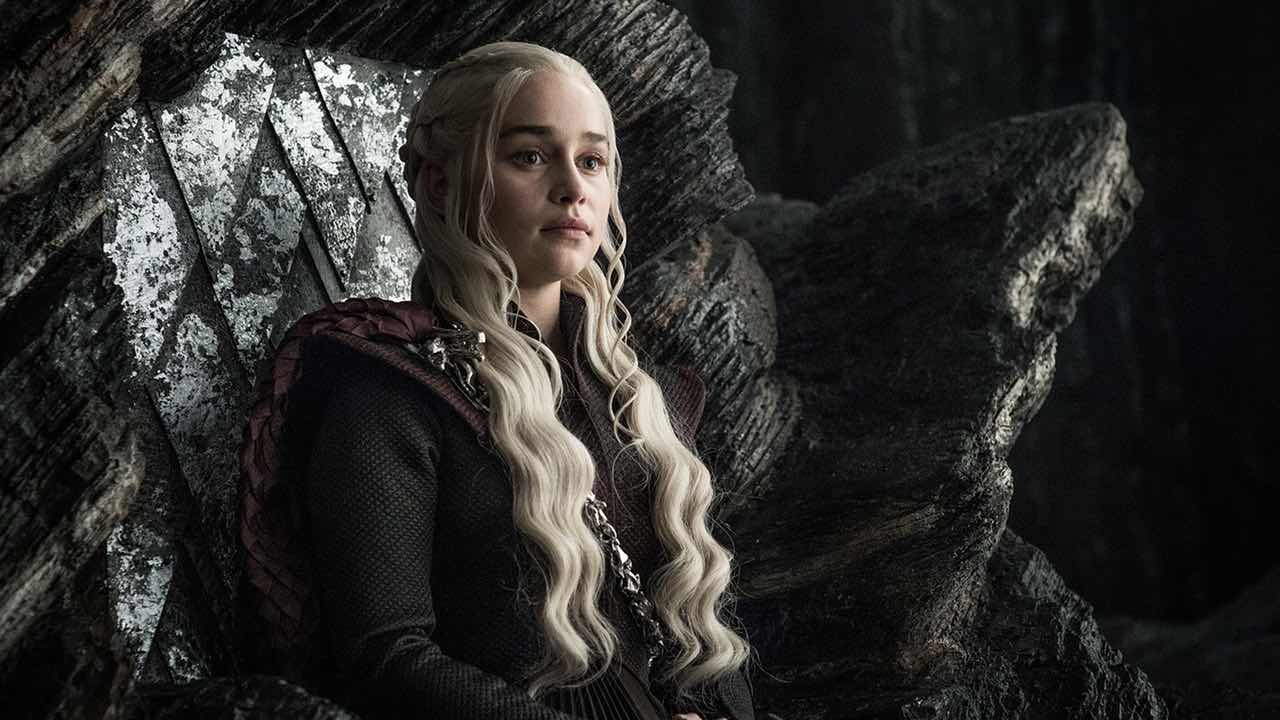
Well, actually, she’s not his cousin, she’s his aunt.
As Matt points out, this episode had a LOT of fun with the dramatic irony of Jon Snow’s parentage – I particularly liked when Jon says “I am not a Stark”
*immediately swooped by dragons*
I’m just going to assume that for the rest of the time that Jon is on Dragonstone, whenever he says anthing about his ancestry, a dragon will just be waiting to swoop overhead and remind the audience.
Oops — fixed. I misremembered Rhaegar as the Mad King’s brother, not his son, probably because his and Dany’s relative ages.
Does anyone else feel a little cheated by how quickly Dany’s grand alliance is falling apart? Highgarden is supposed to be a major power, and it’s Diana Rigg for crying out loud. But the fall of House Tyrell isn’t even the B plot of this episode. Wouldn’t it have been better to just let them all get blown up together at the end of the last season?
It’s like they just wanted to put Dany way up high at the start of the season so that she can fall down over the first half of the season and then climb back up by the very end of the season. It feels so artificial and calculated.
For me the worst thing about it is Euron, who apparently is everywhere? The new Iron Fleet seems like it jumps sides of Westeros.
Don’t even get me started on Euron.
There is no reason to believe that the Iron Fleet stays as one giant armada, and many reasons (mostly practical) to believe that if you have a thousand ships and your opponents’ fleets are comparatively weak that you would split your forces a bit to project power in several locations.
The quick fall of the Tyrell’s is also annoying because it actually would not have been that hard to make it seem feasible.
I think, and this is me filling in the show’s lack of explanations, the idea is that they basically loose the bulk of their army when the Tarlys (their most stalwart, most militarily gifted supporters) turn to the Lannisters. In addition, they could have mentioned how, without Ellaria getting to Dorne, they lost their back up. But yeah, it seems too fast. I think they were so eager to have the rusprise of Casterly Rock being empty that they didn’t set up the Tyrell’s fall well enough.
So, I’d like to think that the dragon that flew over Jon is Raeghon.
My subtheory to the “the Dragon has three heads” theory (that there will be 3 last Targaryens and each gets a dragon) is that Jon gets Rhaegon, since he’s named after Jon’s biological father. That being said, I actually can never really tell the dragons apart unless it’s Drogon and he’s standing more or less still (is that specieist of me?) so I actually have no idea.
Or should we start looking for links between Viserys and other characters to figure out who gets to ride his namesake dragon?
I’m sad to see the Queen of Thorns go. Diana Rigg clearly had a ball with this role. I seldom recall an actress so clearly enjoying herself. Her death was great because she reveals that she killed Joffrey after she drinks the poison. This way Cersie can’t dream up a more creative and crueler execution. Which is just as well, one cruel execution per episode is enough.
Emma Peel, a badass to the end.
I can see why the rulers at King’s Landing have so little respect for their citizenry, as they are so eager to cheer any head on any metaphorical or metaphorical stick
It was interesting to see Sansa’s reaction to her baby brother claiming to be a three-eyed raven and spouting metaphysical mumbo-jumbo. I do hope we get the Sansa-Arya reunion soon. Sansa will learn that her sister has become an assassin bent on revenge, a trait that Sansa will find horrifying and useful.
I will wager that the Sansa/Arya reunion will be somewhat delayed. I’m guesssing Arya either shows up wearing somone else’s face (because she’s just cagey like that) or she shows up, sees some Littlefinger-inspired-nonsense going down, and then throws on someone’s face. Remember that Arya thinks that Jon is still at Winterfell, and she never really got along with Sansa. So when she hears that Jon is gone, she might think (wrongly) that Sansa is just a pawn or whatever, and play it safe.
That said, I’m looking forward to that reunion as well! Those actresses were always fun to watch together, and it will be really interesting to see how Assasin-Arya deals with her once-meek-but-now-firmly-in-command sister. (Though not as much as the Arya/Jon reunion, which GoT had better not deny to us).
Arya may well not show up until the Season Finale, carrying Cersie’s head on a spike. Good point about her wearing another face. For all we know, she may already be at Winterfell, sussing out the situation.
I liked how Sam is assigned the Citadel’s photocopying. Someone’s gotta do it.
BTW, thank you for this forum. The other popular GoT forums at The AV club and Previously TV have literally thousands of comments, it’s nice to have a GoT forum that is manageable.
We too are pleased with our merely moderate popularity. It keeps things civil.
In my fan-fantasies, Arya shows up just in time for her and Sansa to kill Littlefinger together.
I don’t know what the set up or even the reason would be for this. I just really want to see Littlefinger get got. And I think it would be a nice reunion for two sisters who weren’t getting along before their whole family was split apart and put through hell. It would give them a shared interest!
Wait, do we still think that Arya is even going to Winterfell? I thought that she changed her mind and went back south to kill Cersei after Nymeria gave her the cut direct.
Oh that’s interesting. I took that scene as “I’m still going to Winterfell, but I know you can’t go with me.” Nymeria got to Nymeria, man.
Now that you mention it, I had not thought of Nymeria inspiring Arya to go South. Like Matt, I had assumed that Arya was just saying “You’re a wolf, not a dog, so you’re not going to go with me, Arya, who is going to keep going to Winterfell.”
While it’s an entirely plausible/possible reading of the scene I still think Arya is heading North – the lesson of Nymeria wasn’t “go your own way,” but rather “run with your own pack.”
I think “you’re a wolf, not a dog” is spot on, but I assumed that reflected back onto Arya herself. In her heart of hearts, she’s a wolf. Retreating to the safety of her family is out of character for her. (Not to the point where it would be unbelievable — but if she did that, it would show her character CHANGING. Reverting to a more innocent version of herself, perhaps.)
The scene that really tickled me this week was the ‘think and play like chess, and you’ll never be surprised’ speech by Littlefinger. This had me grinning from ear to ear as it played out, as I interpreted in the moment as Littlefinger basically saying ‘I love you, and we fit together’ by different words. It was also a nice little summation of his character for anyone who hadn’t clued into the fact that he’s another side of the same coin that Varys inhabits.
After considering it, Sansa’s reaction was fairly blank and could be read as either being frozen as she considered how much sense this made to her (and her possible dislike of how much his advice appeals to her) and how Littlefinger gets her like no one else does, or as her not wanting to give anything away to Littlefinger, as her optimal strategy for dealing with him so far is to be withholding of what she knows he wants while also doing just enough to keep him on-side and continue sifting though his advice for the sparkly gold.
*Jaime
i missed that episode
unn.edu.ng